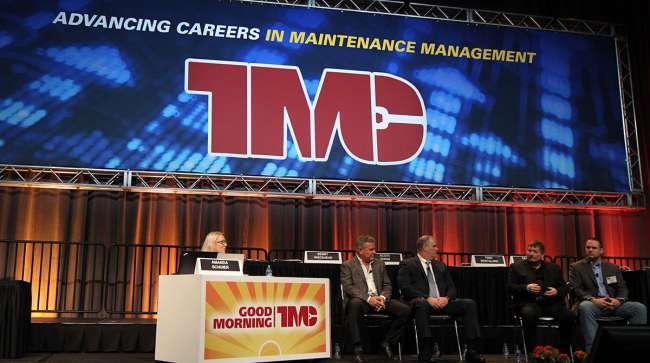Staff Reporter
Fleets, Dealers Discuss Open, Honest Communication

[Stay on top of transportation news: Get TTNews in your inbox.]
ATLANTA — Honesty and communication are the best techniques to help fleets and service dealers work together, according to representatives from both sides of that relationship.
Dealer managers and trucking executives participated in a discussion about how to maximize uptime at American Trucking Associations’ Technology & Maintenance Council annual meeting Feb. 25. Uptime means keeping trucks functioning rather than out of commission in the shop or on the side of the road.
The relationship between fleets and service providers can sometimes be challenging. Fleets work with service providers to get their trucks repaired while dealing with the pressure to complete deliveries. At the same time, service providers balance demands from numerous customers and determine priority for the trucks queued in their shops.
“Don’t yell and scream at anybody. Just treat people how you would want to be treated,” said Tony Morthland, director of equipment and facilities at Hudson, Ill.-based Nussbaum Transportation. “It’s like arguing with your wife. You think you’re going to win, but you never do. You need each other, and you just have to work together to solve the problems.”
Morthland said these challenges require flexibility and coordination. Drivers might work with dispatch officers to see if they can rearrange loads. Fleets may be forced to get a rental truck or tow the disabled vehicle to another location.
Travis Dunn, general manager of Truck Centers Inc.’s location in Troy, Ill., said his group will tow a truck to another location for a customer, even if it requires going to another state. Truck Centers Inc. is a dealer group represented across Indiana, Illinois and Missouri.
“The bottom line is, you’ve got to take care of your customer,” Dunn said.
The participants stressed the importance of honesty with one another. Dunn said his team updates the customer as soon as it assesses a truck and figures out what’s wrong.
Morthland said it is better to be a service provider that tells a customer upfront that a job will take three days than a provider that says a truck will be ready the same day and then calls back to say the work will take longer than expected.
“We can’t plan anything,” Morthland said. “It’s really frustrating when people do that, and we try to stay away from those service providers if we can. You’ve just got to be honest.”
Scott Dixon, operations manager at Four Star Freightliner, a truck dealer with locations across the Southeast, said his team has benefited from measuring throughput every week and segregating the types of repairs that have to be made. As a general rule, he said any job that will take less than four hours goes to a certain team. Dixon said more than 60% of the team’s repairs are completed within 24 hours.
Dunn recommended measuring backfill rate to help service providers know what parts they have available and what parts they need to restock.
Panelists also expressed the importance of a solid preventive maintenance program, which can help fleets identify repeat issues with their vehicles. Morthland advised fleets to frequently re-examine their preventive maintenance practices to keep up with what components may be causing issues.
It also helps if a driver has a certain level of mechanical knowledge, Morthland said, adding that some drivers carry tools so they can make repairs.
“We’ve got different levels of drivers,” Morthland said. “There’s a lot of people that don’t know much about the trucks. They still have to know what that noise is [or] what that vibration is.”
Just as the industry faces a shortage of truck drivers, it also has a dearth of technicians.
Demand for new diesel technicians is expected to reach 25,655 in 2021, according to research published by TMC and TechForce Foundation, a nonprofit organization encouraging careers for professional technicians.
During one of several audience polls that occurred throughout the session, some 93% of participants assembled in the large event space said the technician shortage was having a negative effect on uptime.
Dixon said he and his team members start to reach students as young as grade school. They bring a truck to a school so students can place their hands on the vehicle and learn about the industry. Dixon also stressed the importance of talking to parents and explaining the opportunities available through a career as a technician.
Want more news? Listen to today's daily briefing:



